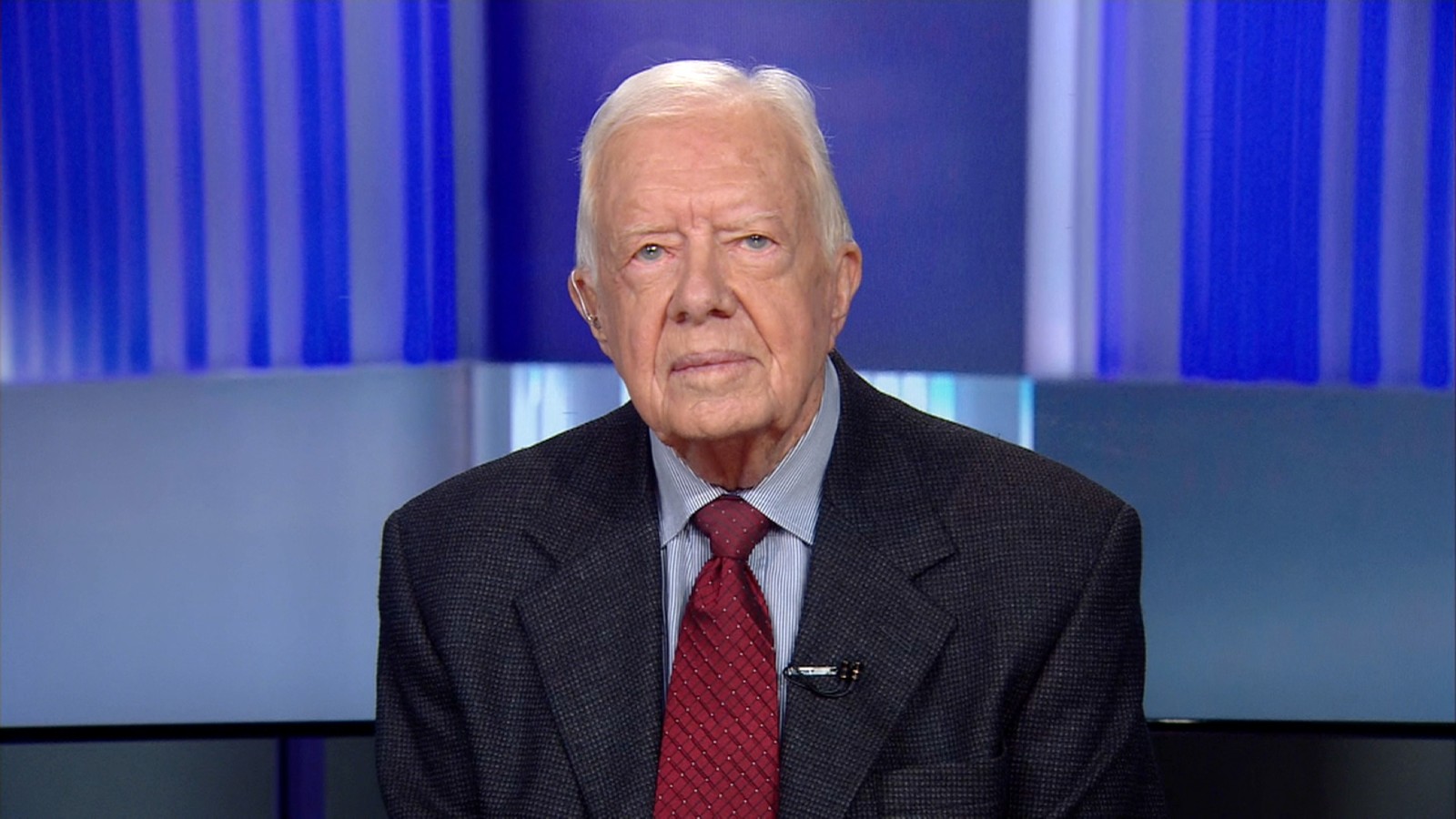Jimmy Carter: A Comprehensive Look at the 39th President's Life and Legacy

James Earl "Jimmy" Carter Jr., the 39th President of the United States, stands as a monumental figure in American history. Known for his humanitarian efforts post-presidency, Carter's life is a tapestry of public service, personal integrity, and resilience. This article delves deeper into his journey from a farmer's son in Georgia to a Nobel Peace Prize laureate, providing a detailed exploration of his life and contributions.
Quick Facts About Jimmy Carter
| Full Name | James Earl "Jimmy" Carter Jr. |
|---|---|
| Date of Birth | October 1, 1924 |
| Age (as of 2024) | 100 years old |
| Occupation(s) | Politician, Humanitarian, Author |
| Nationality | American |
| Height | 5 feet 9 inches |
| Net Worth (2024) | $10 million |
| Source of Wealth | Politics, Book Royalties, Public Speaking |
| Parents | James Earl Carter Sr., Lillian Carter |
| Marital Status | Married |
| Spouse | Rosalynn Smith Carter |
| Children | Jack, James, Donnel, Amy |
| Education | United States Naval Academy |
| Known for | 39th President of the United States, Nobel Peace Prize Winner |
| Major Awards | Nobel Peace Prize (2002) |
Humble Beginnings: Early Life
Born on October 1, 1924, in Plains, Georgia, Jimmy Carter was the first U.S. president to be born in a hospital. His father, James Earl Carter Sr., was a successful businessman, while his mother, Lillian Carter, was a registered nurse known for her humanitarian work. Carter's early years were shaped by the values of hard work, community service, and education.
Carter attended the United States Naval Academy, where he graduated in 1946. His time in the Navy was marked by service in the submarine force, which laid the foundation for his disciplined approach to leadership.
Political Ascent: From Farmer to President
The Genesis of a Public Servant
Carter's political career began at the local level when he was elected to the Georgia State Senate in 1962. His tenure was characterized by a commitment to civil rights and efficient governance. This grassroots experience provided Carter with a profound understanding of the needs and concerns of everyday Americans.
Presidential Campaign and Term
Elected as the 39th President of the United States in 1976, Jimmy Carter's presidency was a period of significant domestic and international challenges. His administration is remembered for its focus on energy conservation, the establishment of the Department of Energy, and the Camp David Accords, which brokered peace between Egypt and Israel.
Achievements and Legacy
Carter's presidency saw the deregulation of the airline and brewing industries and the creation of the Superfund to clean up hazardous waste sites. Despite these accomplishments, his tenure was marred by the Iran hostage crisis and economic difficulties, which contributed to his defeat by Ronald Reagan in the 1980 election.
Post-Presidency: A New Chapter in Public Service
Continued Advocacy and Humanitarian Efforts
Post-presidency, Carter did not retreat from public life. Instead, he dedicated himself to humanitarian causes through the Carter Center, founded in 1982. The Center focuses on human rights, disease prevention, and conflict resolution. Carter's work in eradicating Guinea worm disease and promoting fair elections worldwide has earned him global respect.
Financial Overview
Jimmy Carter's net worth, estimated at $10 million in 2024, stems from his political career, book royalties, and public speaking engagements. His financial journey reflects a life committed to service rather than personal wealth accumulation.
Personal Life and Public Perception
Family and Relationships
Carter married Rosalynn Smith in 1946, and their partnership has been a cornerstone of his life. Together, they have four children: Jack, James, Donnel, and Amy. The Carters' enduring marriage and mutual support are well-documented, adding a personal dimension to his public persona.
Public Image and Media Coverage
Carter is widely respected for his integrity and commitment to peace. While his presidency faced criticism, his post-presidential work has received widespread acclaim. Carter's legacy is a testament to the impact of lifelong dedication to public service.
Lasting Impact and Contributions
Jimmy Carter's influence extends beyond his time in office. His work through the Carter Center and his efforts in promoting peace and human rights have left an indelible mark on the world. Carter's legacy is not just that of a former president but as a tireless advocate for justice and humanitarian causes.
Frequently Asked Questions About Jimmy Carter
-
What is Jimmy Carter best known for?
- Jimmy Carter is best known for being the 39th President of the United States and for his extensive humanitarian work post-presidency, including his Nobel Peace Prize in 2002.
-
What are some significant achievements of Carter's presidency?
- Significant achievements include the Camp David Accords, the establishment of the Department of Energy, and the deregulation of the airline and brewing industries.
-
How old is Jimmy Carter as of 2024?
- Jimmy Carter is 100 years old as of 2024.
-
What is the Carter Center?
- The Carter Center is a non-profit organization founded by Jimmy Carter in 1982, focusing on human rights, disease prevention, and conflict resolution.
-
How has Jimmy Carter contributed to global health?
- Carter has significantly contributed to global health through initiatives to eradicate diseases like Guinea worm disease and promoting healthcare access in underserved regions.
Through this detailed exploration of Jimmy Carter's life, career, and enduring impact, readers gain a comprehensive understanding of a man whose legacy transcends his time in the White House. His lifelong dedication to public service remains an inspiring testament to the power of principled leadership.